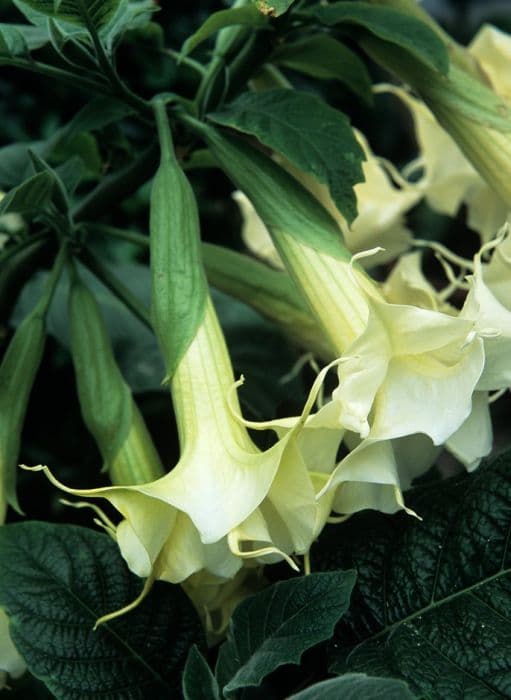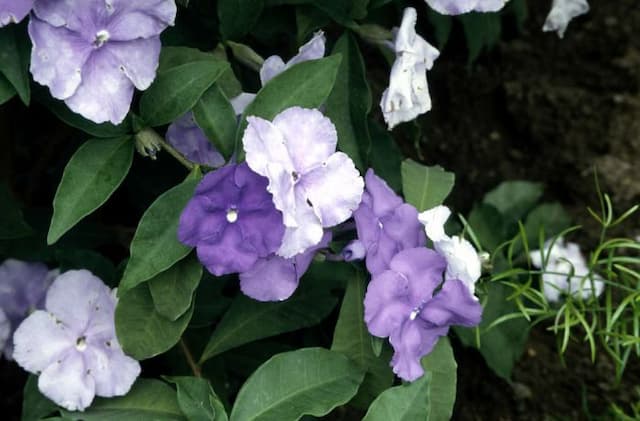Eggplant Solanum melongena 'Scorpio'

ABOUT
The Solanum melongena 'Scorpio', commonly known as the eggplant or aubergine, is a plant with a robust, bushy appearance. It bears sizable, glossy leaves that are typically deep green and have a slightly heart-shaped form with pointed tips. The under surfaces of the leaves may have a lighter green shade, and they are often covered with fine hairs. The eggplant's stem is thick and sturdy, also showcasing a green to purple coloration, which supports the weight of the fruit. Flowers produced by the Scorpio variety of eggplant are star-shaped with a violet-purple hue, often possessing striking yellow stamens at the center, creating a contrast that adds to the aesthetic appeal of the plant. After pollination, the flowers give way to the fruit. The Scorpio eggplant's fruits are characteristically glossy and adopt a deep purple color that may appear almost black in some instances. These smooth-skinned fruits are large, with a shape that can range from oblong to teardrop-like or even pear-shaped, depending on the specific growth conditions and environmental factors. Throughout its growth, the plant displays a verdant presence in gardens and containers, where its dark fruits hang from the stems, sometimes partially obscured by the dense foliage. The overall appearance of the Solanum melongena 'Scorpio' is that of a plant that is as ornamental as it is utilitarian, offering visual interest with its vibrant blossoms and uniquely colored fruits which are ready to be harvested when they reach the desired stage of maturity.
About this plant
 Names
NamesFamily
Solanaceae
Synonyms
Eggplant, Aubergine, Brinjal, Guinea Squash, Garden Egg
Common names
Solanum melongena 'Scorpio'.
 Toxicity
ToxicityTo humans
Solanum melongena 'Scorpio' is a cultivar of eggplant, which is generally considered non-toxic to humans when ripe and cooked properly. However, eggplant belongs to the nightshade family and contains solanine, a toxic compound that can cause gastrointestinal and neurological disorders if ingested in large quantities, especially when the plant is unripe or raw. Symptoms of solanine poisoning may include nausea, vomiting, diarrhea, stomach cramps, headache, dizziness, and in severe cases, even hallucinations and paralysis. Cooking eggplant thoroughly typically reduces the solanine levels, making it safe for consumption.
To pets
Solanum melongena 'Scorpio', commonly known as eggplant, is generally not toxic to pets, such as dogs and cats, when ripe and cooked. However, the leaves and stems of the plant, as well as unripe fruit, do contain solanine and other potentially toxic alkaloids, which can cause gastrointestinal upset in pets if ingested. Symptoms of solanine poisoning in pets might include vomiting, diarrhea, abdominal pain, hypersalivation, weakness, and in severe cases, central nervous system effects like tremors or seizures. To avoid any risk, it is best to keep pets away from the plant itself and only offer them cooked eggplant in small, infrequent amounts, if at all, and after consulting with a veterinarian.
 Characteristics
CharacteristicsLife cycle
Annuals
Foliage type
Deciduous
Color of leaves
Green
Flower color
Purple
Height
2-3 feet (60-90 cm)
Spread
2-3 feet (60-90 cm)
Plant type
Herb
Hardiness zones
5
Native area
Asia
Benefits
 General Benefits
General Benefits- Nutrient-Rich Food: Eggplant 'Scorpio' is a good source of dietary fibers, vitamins, and minerals essential for a healthy diet.
- Low in Calories: Eggplants have a low caloric content, making them an ideal food for weight management and calorie-controlled diets.
- Home Gardening: Cultivating Eggplant 'Scorpio' in a home garden can offer a sense of self-sufficiency and contribute to sustainable living.
- Vegetarian Option: Eggplants serve as a nutritious, meat-free option in many culinary dishes.
- Culinary Versatility: Eggplants can be cooked in various ways including grilling, baking, roasting, or frying, making them an adaptable ingredient in the kitchen.
- Drought Tolerant: Eggplant 'Scorpio' can tolerate dry conditions once established, making it suitable for regions with water scarcity.
- Decorative Plants: With their attractive purple flowers and glossy fruits, eggplants can also contribute to the aesthetic appeal of a garden or landscape.
- Pollinator Attraction: The flowers of the eggplant can attract bees and beneficial insects, which are important for pollination and maintaining a healthy ecosystem.
 Medical Properties
Medical Properties- Antioxidant: Eggplant contains phytonutrients with potential antioxidant activity.
- Cardiovascular health: Some studies have suggested that compounds in eggplant may have a positive effect on blood cholesterol levels and arterial health.
- Anti-inflammatory: Eggplant contains compounds that may reduce inflammation.
- Glycemic control: Eggplant is low in carbohydrates and may help in managing blood sugar levels.
- Fiber content: The high fiber content in eggplant can aid digestion and contribute to gastrointestinal health.
 Air-purifying Qualities
Air-purifying QualitiesThis plant is not specifically known for air purifying qualities.
 Other Uses
Other Uses- Biodegradable Plastics: The skins and pulp of the eggplant can be processed to create a biodegradable plastic that can be used in various products as a more sustainable option.
- Printing Inks: Due to their deep purple color, eggplants can be used to extract natural dyes that are then utilized in the production of eco-friendly printing inks.
- Natural Pesticide: The leaves of the eggplant can be boiled and the extract can act as a natural pesticide to protect other plants from pests.
- Water Purification: The seeds of the eggplant have been shown to have the ability to absorb heavy metals, potentially being used in water purification processes.
- Art Supplies: Eggplant color can be used to create natural paints and pigments for art projects, providing a non-toxic alternative to synthetic colors.
- Decorative Arrangements: Dried slices of eggplant can be used to create decorative pieces or be included in floral arrangements due to their unique texture and shape.
- Eco-friendly Scrubber: The luffa-like texture of the mature fruit can be used as a natural kitchen scrubber when dried.
- Photographic Films: The anthocyanins present in the eggplant's skin could potentially be utilized in the development of photographic films sensitive to certain light wavelengths.
- Acoustic Absorber: The inner fibrous material of eggplant could be explored as a natural acoustic absorber in the construction of soundproof rooms.
- Packing Material: Shredded eggplant stalks and skins can be made into biodegradable packing materials to cushion products during shipping.
Interesting Facts
 Feng Shui
Feng ShuiThe eggplant is not used in Feng Shui practice.
 Zodiac Sign Compitability
Zodiac Sign CompitabilityThe eggplant is not used in astrology practice.
 Plant Symbolism
Plant Symbolism- Prosperity: The eggplant, most commonly known as 'Scorpio', is often associated with abundance and prosperity due to its prolific nature and the large number of fruits it can produce.
- Fertility: Given its seed-rich fruit, the eggplant symbolizes fertility and the potential for new growth.
- Longevity: In some cultures, the eggplant is a symbol of a long, healthy life, partly because of its hardy nature and the nutrients it provides.
- Protection: Some believe the eggplant can ward off negative energies because of its dark, glossy exterior, which is associated with the ability to absorb negativity.
 Water
WaterEggplants, like the Scorpio variety, prefer consistent moisture. Water them deeply once or twice a week, providing at least one inch of water each time, which equates to about 0.6 gallons per square foot. The goal is to keep the soil evenly moist but not soggy. During hotter, drier periods, you'll need to water more frequently. Always check the soil moisture level before watering; if the top inch of soil is dry, it's time to water. Avoid overhead watering to keep the foliage dry and reduce the risk of disease.
 Light
LightEggplant 'Scorpio' thrives in full sun, which means it should receive at least 6 to 8 hours of direct sunlight per day. It is best planted in a spot that gets unobstructed sun from morning through afternoon. These light conditions will ensure the plant has enough energy for robust growth and fruit production.
 Temperature
TemperatureEggplants, like the Scorpio variety, prefer warm temperatures and are sensitive to cold. The ideal temperature range for growing eggplants is between 70°F and 85°F. They can survive temperatures as high as 95°F but growth may slow down, and temperatures below 50°F can damage or kill the plant. Ensure that all danger of frost has passed before planting outdoors, as eggplants cannot tolerate frost.
 Pruning
PruningPruning the Scorpio eggplant is primarily for removing damaged or diseased foliage and to encourage air circulation. Prune any leaves that shadow the fruits to allow them to ripen evenly. The best time to prune is during the morning when the plant is dry, and it should be done as needed throughout the growing season. Regular pruning also helps to focus the plant's energy on producing a healthy crop.
 Cleaning
CleaningAs needed
 Soil
SoilEggplants, including the 'Scorpio' variety, thrive in a well-draining, nutrient-rich soil mix with a pH of about 5.5 to 6.5. A good mix consists of one part compost, one part perlite, and one part peat moss or coconut coir to ensure proper moisture retention and aeration.
 Repotting
RepottingEggplant 'Scorpio' should be repotted roughly every two years, or when roots become pot-bound. Spring is the best time for repotting to give the plant a fresh start before the growing season.
 Humidity & Misting
Humidity & MistingEggplants, such as 'Scorpio', prefer moderate humidity levels around 40-60%. Avoid overly humid conditions as it can promote fungal diseases in the foliage.
 Suitable locations
Suitable locationsIndoor
Ensure full sun, warm temps, stake plants, and fertilize regularly.
Outdoor
Plant in full sun, warm soil, space 24 inches, and provide support.
Hardiness zone
5-12 USDA
 Life cycle
Life cycleThe Solanum melongena 'Scorpio', commonly known as the 'Scorpio' eggplant, begins its life as a seed, typically planted indoors before the last frost date. The seed germinates within 1 to 2 weeks under warm conditions, emerging as a seedling with primary leaves, followed by the development of true leaves. As it matures, the plant enters a vegetative growth phase, producing a sturdy stem and larger leaves, preparing to support future fruit. It then enters the flowering stage, with purple blossoms that are pollinated to produce fruit; under optimal conditions, this occurs within 2 to 3 months after planting. The 'Scorpio' eggplant comes to its fruiting stage after successful pollination, where it develops the characteristic purple, elongated fruits which grow to a suitable size for harvest. After fruiting, if left unharvested, the eggplant will eventually complete its life cycle, seeds may develop and dry within the fruit, which can then be collected for subsequent growing seasons before the plant senesces and dies.
 Propogation
PropogationPropogation time
Spring-Summer
Propogation: The Solanum melongena 'Scorpio', commonly known as the eggplant, is typically propagated through seeds. Seed propagation is especially favorable for this variety, since it maintains the genetic characteristics of the parent plant. Begin by planting the seeds indoors about 8 to 10 weeks before the last expected frost to give the seedlings adequate time to grow. Sow seeds about 1/4 inch (about 6 millimeters) deep in a seed-starting mix and keep the soil evenly moist and at a temperature of around 75°F to 85°F (24°C to 29°C). Ensure the seedlings receive plenty of light to prevent them from becoming leggy. Once the threat of frost has passed and the seedlings are roughly 3 inches (approximately 7.5 centimeters) tall, and have developed a few true leaves, they can be transplanted to the garden, spacing them about 24 to 36 inches (60 to 90 centimeters) apart in rows that are spaced 36 to 48 inches (about 90 to 122 centimeters) apart to allow for sufficient airflow and growth.





![Calibrachoa [Callie Mango]](/_next/image?url=https%3A%2F%2Fplants-admin.emdemapps.com%2Fimages%2Fplants%2F%2Fimages%2F604b6514b1579.png&w=640&q=75)



